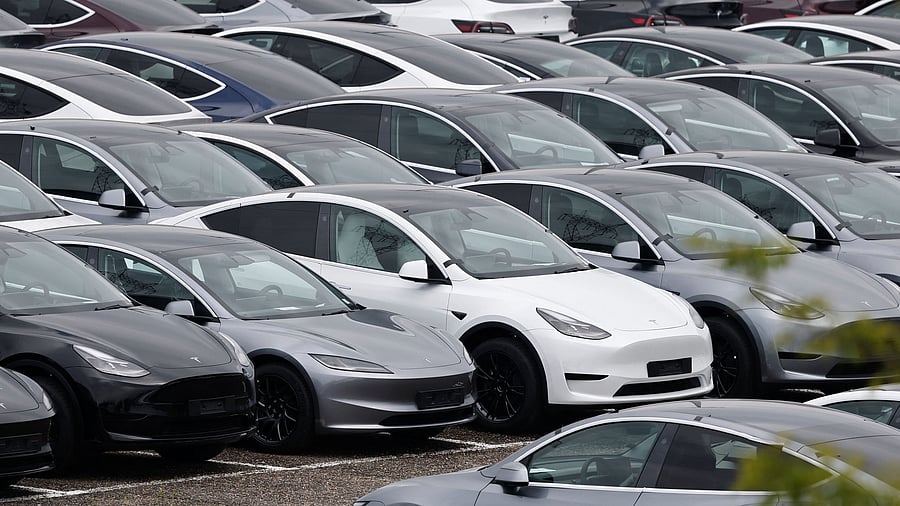
Tesla electric vehicles are pictured at one of the company's delivery centers in Valenton, near Paris, France, April 24, 2025.
Credit: Reuters Photo
Bengaluru: With the imposition of steep tariffs on China by the United States, there has been renewed attention on how India can benefit in electronics manufacturing, including companies like Apple planning to shift iPhone production to India.
There is another ‘sunrise’ sector where experts see a lot of potential for India to take advantage of: Electric Vehicles. Those in the Indian EV industry see reasons for optimism as well as caution.
Washington has imposed 100-125 per cent tariffs on Chinese EVs and increased duties on components like lithium-ion batteries to 50 per cent. Analysts say this creates a complex blend of immediate challenges and long-term prospects, especially in light of the Indian EV sector’s heavy dependence on China for raw materials and essential components like batteries, controllers and motors.
“Approximately 60-70 per cent of all EV-related components are currently imported from China,” stated Vipin Singhal, Associate Director, Anand Rathi Investment. “China commands ~75 per cent of the world’s production of lithium-ion batteries, making India’s reliance very high,” he added.
“The US tariffs create a positive scenario for India. The suppliers initially catering to the US may now divert to India, offering better prices and supply terms. Given that India largely imports raw materials rather than fully finished components, quality risks remain low,” said Jayant Gupta, co-founder at Alt Mobility.
But the threat of cheaper Chinese products overflooding the Indian market (i.e. dumping) still lingers. Experts warn that this could disrupt domestic manufacturing. “Indian EV manufacturers, such as Tata and Mahindra, who have invested heavily in local EV production, might face pricing pressures, impacting profitability and long-term sector growth,” warned Rahul Shresth, Vice President at Avener Capital.
New horizons for EV makers
The global tariff scenario might also generate a possibility of India scouting new foreign trade markets. There has been a shift towards “China Plus One” policy, sped up due to the tariff wars. This offers India a chance to scale its EV manufacturing base and explore new export markets, particularly the United States. “Earlier, Indian EV exporters faced stiff competition from China. Now, with the US erecting barriers, Indian firms have an opening to increase their volumes to the US,” Gupta said.
However, is India ready to seize this opportunity? “At present, India is far from becoming a global player. To compete internationally, India needs to develop infrastructure, supply chain capabilities and global partnerships, invest heavily in IP (Intellectual Property) and talent, and improve research and development),” Singhal observed.
A pivotal role will be played by the government in navigating this evolving scenario. Although initiatives like the production-linked incentive schemes for batteries and auto components have stimulated investment, concerns have emerged after reports of PLI being withdrawn, due to low achievement of production targets.
A premature rollback could hinder momentum and ending the PLI schemes might slow down localization and capital inflows, experts said. Key projects could be destabilized and investor confidence eroded.
FILE PHOTO: A BP Pulse electric vehicle charging point is seen in London Britain July 16 2021. Picture taken July 16 2021.
Credit: Reuters Photo
The cumulative EV sales in India reached 41.35 lakh units by the end of FY2024. This is a significant boost from just 1.5 lakh units in FY2020. Going forward, India’s EV market is expected to grow from around $7 billion today to $120 billion by 2030.
China’s halt in the supply of critical components like the rare earth magnets could also disrupt local EV production. For optimal growth, India must address the vulnerabilities: build a robust domestic supply chain, strengthen stronger alliances for critical mineral access, and upgrade EV infrastructure nationwide.
“The Indian EV sector stands to benefit from global realignment, but its success depends on how quickly we scale local capabilities to match emerging global opportunities,” Gupta said.